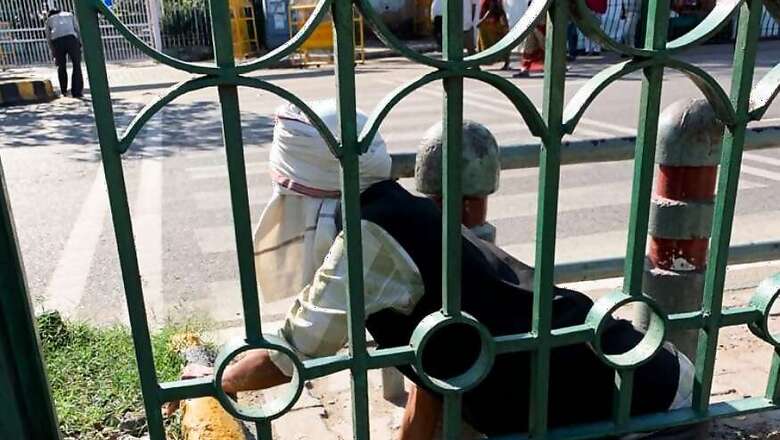
views
New Delhi: Seeing his wife suffer from hunger for the last three days has begun to affect Man Singh mentally. You can tell once you start talking to him. He talks about food mostly. Sometimes, he talks to himself and often breaks down.
From the footpath outside AIIMS’ Gate Number 1, where we met, we walk into the subway to meet his wife. He points at a stick-thin figure lying at a corner with other patients and their attendants. “That’s my wife Suman Devi. She’s grown weak over the last three days, doesn't move much. You want to meet her? But I think she's sleeping right now,” he says and decides not to disturb her. A few days ago, at AIIMS, she was diagnosed with pancreatic cancer.
Singh has barely had a meal himself in the last 72 hours. But the lack of food hasn’t robbed him, a farmer from Uttar Pradesh’s Shahjahanpur, of his sense of irony.
“‘Dekhiye chaaron taraf ann ke bhandaar hain. Aise bhi log hain jinke paas khaane ko bohot kuch hai. Lekin main, ek kisaan, jise log ann ka daata kehte hain, aaj ek ek tukde ke liye taras raha hun’ (See in any direction you see there are stores of food. There are such people also who have much to eat. But I, a farmer, who is revered as the provider of food, am pining for a grain of rice),” he says.
After his wife fell very sick, in early 2019, Singh took her to a lot of doctors in and around Bareilly, and spent most of their savings, but nobody could treat her. Then in November last year he got her to AIIMS. For three months she was treated at the gastroenterology department from where she was shifted to the cancer ward.
The doctors had diagnosed her with pancreatic cancer. It’s a rare and very aggressive strain of cancer. Experts say around 95% of the people diagnosed pancreatic cancer die from it. Suman Devi was given some medication on March 19 and asked to return a month later.
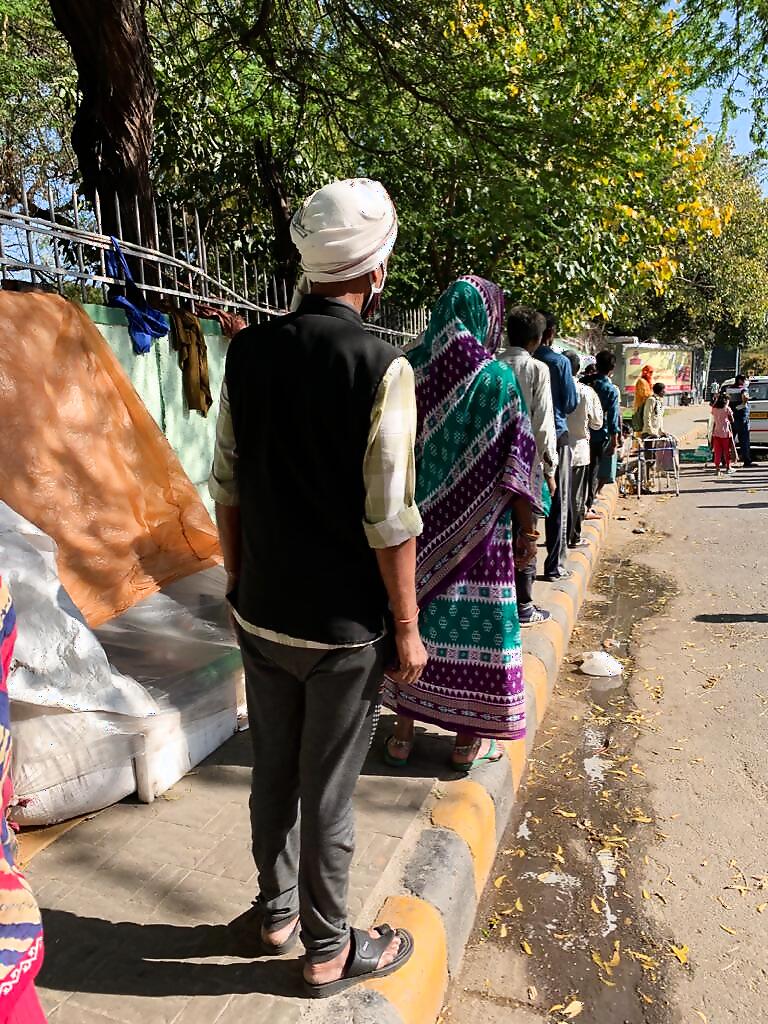
Man Singh waits in a queue to get food his wife and himself. (News18)
Man Singh thought it best for his wife to not travel immediately after she was given medication. If they could stay around the hospital, on its footpath, where they had lived for four months, for another week, she could be rushed to the doctors if any complications arose from her new medicines, he thought. Then on the evening of March 24, Prime Minister Narendra Modi announced a nationwide curfew to prevent the spread of coronavirus.
Public buses, trains, and all affordable means of transport for the common people were closed. Singh and his ailing wife were stuck here. Things deteriorated pretty soon after when police refused to allow langars, which was the only source of food for Singh, his wife and hundreds of other poor patients and their attendants. Section 144 of the CrPC that prevents assembly of four or more people had been enforced everywhere.
“‘Hame do din pehle bhi suuchna mili hoti to apne ghar chale jaate. Footpath pe buukh se marne se acha to insaan apne ghar pe beemari se marna pasand karega. Ab yahan zinda kaise rahein’ (Had we been told even two days before the curfew, we would have gone back to our homes. It was better to die of a disease in one’s house than to die of hunger on a footpath. Now how do we survive here)?”
Singh says, a kindly Sikh man used to come every day at four in the morning and distribute food. “He used to even wake us up and tell us to collect the food. To parents with little children he used to give that special milk... Bournvita... Something like that. But now police isn’t allowing him and kind people like him to distribute food here, so hundreds of people are dying,” Singh says.
It’s around 1:30 in the afternoon, we are standing on the footpath outside AIIMS’ Gate Number 1, when someone shouts about food being distributed somewhere down the road.
Singh who is fifty years old, makes a dash for it. A few hundred meters away, towards IIT, he joins a queue. People with walkers and handcarts are standing ahead. This might be the first proper meal that he and his wife will share in three days, if he's lucky.
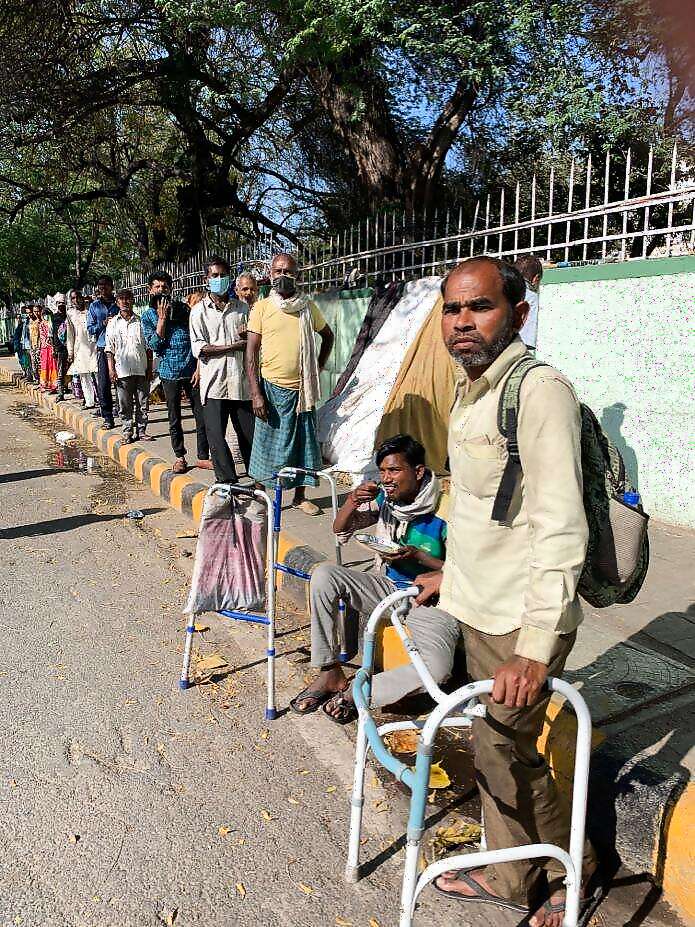
People wait for food distributed outside AIIMS during the lockdown before police chase them away (News18)
“Yesterday also there was a queue. I stood for 10 minutes but before my turn, everything finished. In the morning, someone gave us a packet of four puris which I shared with my wife. Tell me what will someone with a farmer’s appetite do with two puris so small,” he says, outlining small circles on his palm.
After five minutes, a couple of policemen walk down to the person distributing food from his car. They chase him away and disperse the queue. A policeman shouts at the queue of desperate, hungry people, “‘Pure desh mein corona ki wajah se curfew laga hai. Tum logon ko maalum nahi hai kya’ (The entire country is placed under curfew because of coronavirus. Don’t you people know that)?” Some people outraged by the behavior of policeman shout at him. “Police chor hai”. Once again, Singh starts towards his wife without a morsel.
A person who has bonded with Singh over time, Murad Khushwaha, a labourer, also from Shahjahanpur, walks along with his child in his arms. “Corona khatam hoga gareeb public ke marne se (Coronavirus will end when all the poor die),” says Khushwaha.
His young daughter was diagnosed with cancer a few days ago. She underwent a round of Chemotherapy and has another round scheduled on April 4. After that Khushwaha doesn’t know where he’ll go.
Some people who made it to the queue in time were hiding in corners, away from the sight of police, devouring their plates of khichdi which they had been handed.
Singh and his wife need not have suffered all this agony. A private ambulance driver had offered to drop them to their house in Shahjahanpur for Rs 9000.
Since only ambulances are allowed on roads during the ongoing curfew, many poor and desperate people reported being exploited by ambulance drivers in this fashion. Those who can afford it are paying them to go to their homes. But arranging that sort of money was well beyond Singh’s means.
“‘Yahan tak aane mein paisa rehta kahan hai kisi ke paas. Yahan to wohi aata hai jo puri tarah se samaapt ho gaya ho. Itna paisa hota to yahan kyun aate? Bareilley ke kisi private aspataal mein dikhwa dete. Ye aakhri stage hai bhaisaab. AIIMS gareeb logon ki aakhri stage hoti hai.’ (By the time people come to AIIMS they don’t have money left. Only those who have exhausted all other options, and their money, come here. If we had that sort of money, to pay the ambulance driver, why would we have come here? We would have gone to a private hospital in Bareilly. This is the last stage. AIIMS is the last option for poor people in India),” he says.
It’s been more than 10 minutes when we see a woman carrying small steel tiffin boxes break down. She was also returning to her space in the subway empty handed.
Her name is Jaya Devi. She and her husband used to work as daily wage labourers in their district of Banka, Bihar. The couple came to AIIMS with their 10-year-old child, who has a hole in his heart, on March 13.
They got an appointment with a doctor after two weeks on March 25, the day when, following Prime Minister’s announcement of a nationwide lockdown, all OPD services at AIIMS were shut down indefinitely. Like Singh, Khushwaha, and hundreds of other people, she doesn’t know where to go now.
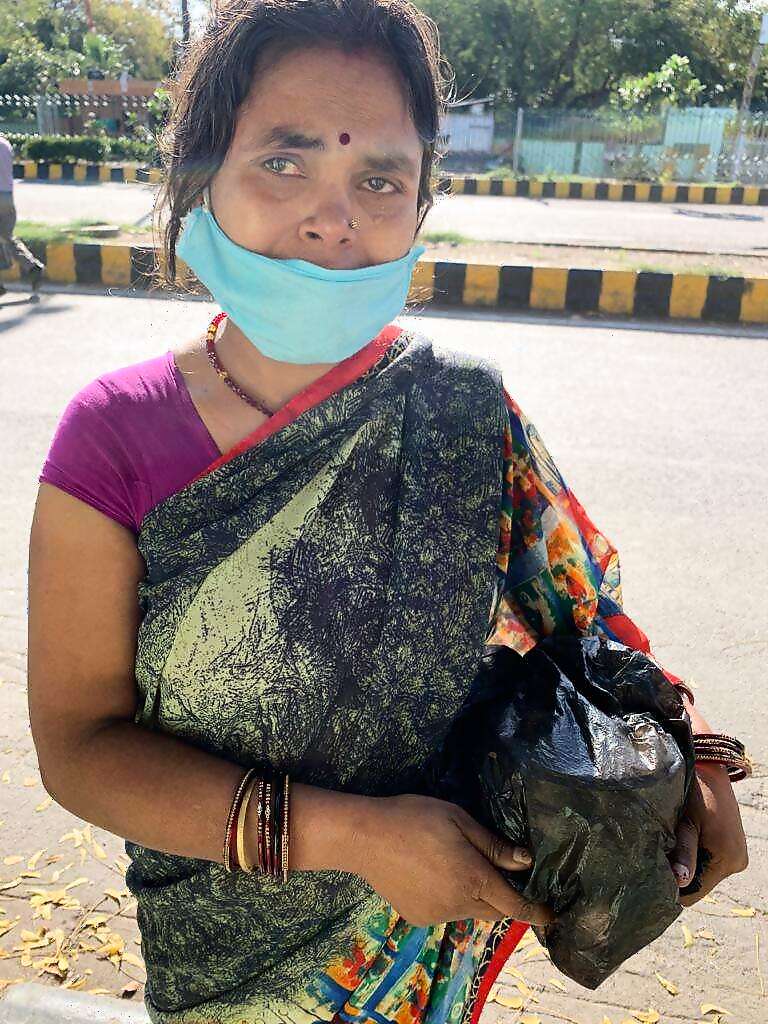
Jaya Devi as she returns without at food for her ailing son. (News18)
“‘Humne teen chaar din se kuch nahi khaaya hai. Canteen mein 40 rupay ka khaana milta hai. Wo khareed ke apne bache ko hi khilaate the. Ab saare paise bhi khatam ho gaye. Dawaai ke liye bhi paisa nahi hai. Mutthi bhar muuda khaake din bita rahe hain’ (For the last three to four days, we haven’t eaten. The canteen is selling a plate of rice for Rs 40. We feed it all to our child. Now we have exhausted all our money. We have nothing left to buy medicines with. My husband and I are surviving on a handful of puffed rice),” Jaya Devi says.
But she’s more anxious because she is seeing her son, who has difficulty moving around due to his heart ailment, shrinking.
“‘Mere bache ka muh itna sa ho gaya hai. Usko thoda nimbu cheeni pilaya tha lekin kuch kha nahi raha hai subeh se. Bachha keh raha hai mera ilaaj karo main padhna chahta hun. Keh raha hai mujhe theek karo main padhna chahta hun’ (My son’s condition is deteriorating. I have been feeding him sweet lime water by he has no appetite. He has been saying get me treated, I want to get well and study ),” Jaya Devi says with tears rolling down her cheek and leaves.
Her distress leaves Man Singh devastated. “‘Us maa se pucho jiska bache ki aisi haalat ho rahi hai. Us maa ke kaleje se pucho. Tukde ho rahe honge jab uska bacha rota hoga. Arre Ram. Hamara bacha aisa kahe...humara tan bik jaaye...jab tak saans hai, hum uske liye sab karenge. Hazaar khand aadmi mar jaayega idhar agle ek hafte mein. Hazaar khand’ (Ask this mother what is her child’s distress doing to her. Ask her what it is doing to her. Her heart must be breaking into pieces. Oh God. If my child were to talk like this... till I were to sell my body... till my last breath I would do whatever I could for him. Mark my words a thousand people will die here… A thousand).”
There is nothing to do now except to wait on the footpath till one hears about someone else distributing food. It has been raining all through the week. With most of the places shut down, restrictions imposed on public transport under the national lockdown, those seeking treatment at AIIMS’ and their families have no refuge.
Nathuram’s young daughter has cancer in her leg. She can only move around with her walker. Their family is also stuck here after the national lockdown. Her family covers her with a plastic sheet every time it rains.
But her parents say that since their daughter has only just had a surgery in her affected leg, each time it rains, some water does seep through to her clothes and sends ripples of pain throughout her body. The three-week-long curfew will only end on April 15. Till then the family says their daughter has no option but to endure this life.
It is around 5 in the evening when a saffron-robed sadhu, who has also come to AIIMS for treatment, tells Singh that food is being distributed on the other side of the road, near Safdarjung hospital. “But how do I go? It will take a lot of time to go through the underpass. I can’t climb over the tall fence,” Singh wonders aloud while walking towards the divider.
He sees a queue of people on the other side, which means food is being distributed and police isn’t chasing people away. There is a small opening under the fence. It is only enough for a child to crawl through. Man Singh crawls through those few inches of space and runs to the other side to join the queue in which at least 30 people are standing ahead of him. Like Man Singh most of the people in the queue haven’t eaten for the last three to four days. But they stand in a perfect queue and behave themselves with remarkable discipline.
Delhi policemen who had chased away a langar on the other side of the road are facilitating food distribution on this side. The rules of when and how much people can eat seem quite arbitrary and ambiguous.
Singh makes a call to his wife, who he says must also have been roaming around looking for food. He tells her to not worry and to go back and rest, he’s found food. He’s coming.
Fifteen minutes into the queue and someone walks past him saying ‘rotis’ have finished. Another five minutes later Singh, who is still at least 15 places behind in the queue, hears a man saying that everything is finished. Only bananas are left. He’s getting increasingly agitated, almost to the point of a collapse.
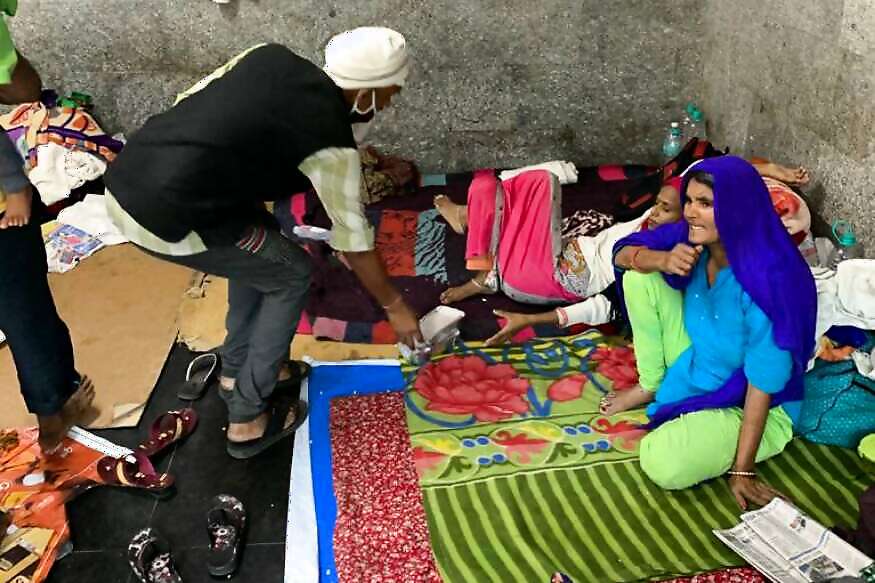
Singh gives a box of food to his ailing wife (News18)
But just then a carton of ‘chapatis’ and ‘sabzi’ are brought in by someone. Singh finally gets his share. He tells those distributing the food that he needs two packets – one for himself and other for his wife. He’s pushed away. There are many more like him. Everyone is given only on box of food.
But he’s very happy. In no time he’s crawled past the divider and is back in the subway. He goes over to Suman Devi who is resting against the wall and gives her the box. And we come out of the subway, back to the footpath.
“‘Is sansaar mein khaana sabke liye paryaapt hai. Bas apna hissa milne mein kabhi kabhi thodi der lag jaati hai’ (In this world, there is enough for everyone. Only sometimes it takes a while for you to get your share),” he says smiling for the first time in the day. Singh has perhaps forgotten that he is still hungry.











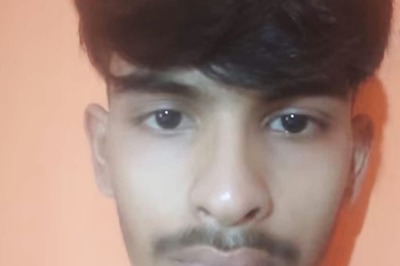

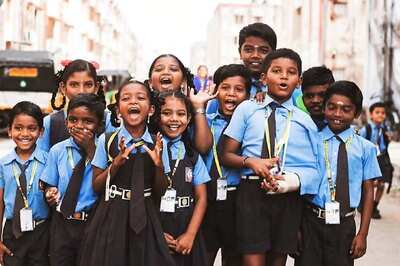
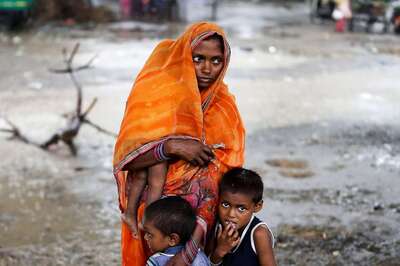
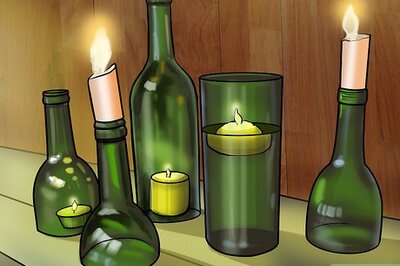



Comments
0 comment